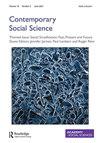Supporting interviews with technology: how software integration can benefit participants and interviewers
IF 3.9
Q1 SOCIAL SCIENCES, INTERDISCIPLINARY
引用次数: 1
Abstract
ABSTRACT The interview experience is only one component of the process of interviewing – software programmes can coordinate the pre-interview steps and begin a digitally-mediated relationship with participants long before the actual interview commences. This essay provides examples of how researchers can maximise their time and energy by digitally coordinating the steps of the interview process, thus reducing the logistical time and stress for all involved. Smoothly tying together the user experience from the first click of interest, to consent, to scheduling, and finally payment, confers many advantages to both the interviewer and interviewee. Based on a study with over 700 online interviews conducted from 2019 to 2022, this article gives insight into the platforms and customisation options that allowed a relatively small research team to conduct a large qualitative study. The automation of portions of the typical process allowed us to spend more of our time and intellectual resources on the interviews and initial analysis rather than logistics. We discuss the process of digital consent, interview scheduling using calendar managers, and standardised communication coordination. We describe the participant experience, give detailed descriptions of how we integrated the software associated with interviews, and provide our insights on the process. This article is a timely guide for qualitative researchers to lessen their load by coordinating the logistics of interviewing more efficiently.用技术支持面试:软件集成如何使参与者和面试官受益
摘要面试体验只是面试过程的一个组成部分——软件程序可以协调面试前的步骤,并在实际面试开始之前很久就开始与参与者建立数字中介关系。这篇文章提供了一些例子,说明研究人员如何通过数字协调面试过程的各个步骤来最大限度地利用时间和精力,从而减少所有参与者的后勤时间和压力。从第一次点击感兴趣到同意,再到日程安排,最后是付款,将用户体验平滑地结合在一起,为面试官和被面试者带来了许多优势。基于2019年至2022年对700多个在线访谈的研究,本文深入了解了允许相对较小的研究团队进行大规模定性研究的平台和定制选项。典型流程部分的自动化使我们能够将更多的时间和智力资源花在面试和初步分析上,而不是物流上。我们讨论了数字同意的过程、使用日历管理器的面试安排以及标准化的沟通协调。我们描述了参与者的体验,详细描述了我们如何集成与面试相关的软件,并提供了我们对面试过程的见解。这篇文章为定性研究人员提供了及时的指导,通过更有效地协调面试的后勤工作来减轻他们的工作量。
本文章由计算机程序翻译,如有差异,请以英文原文为准。
求助全文
约1分钟内获得全文
求助全文
来源期刊

Contemporary Social Science
SOCIAL SCIENCES, INTERDISCIPLINARY-
CiteScore
6.40
自引率
8.30%
发文量
15
 求助内容:
求助内容: 应助结果提醒方式:
应助结果提醒方式:


